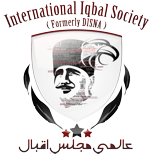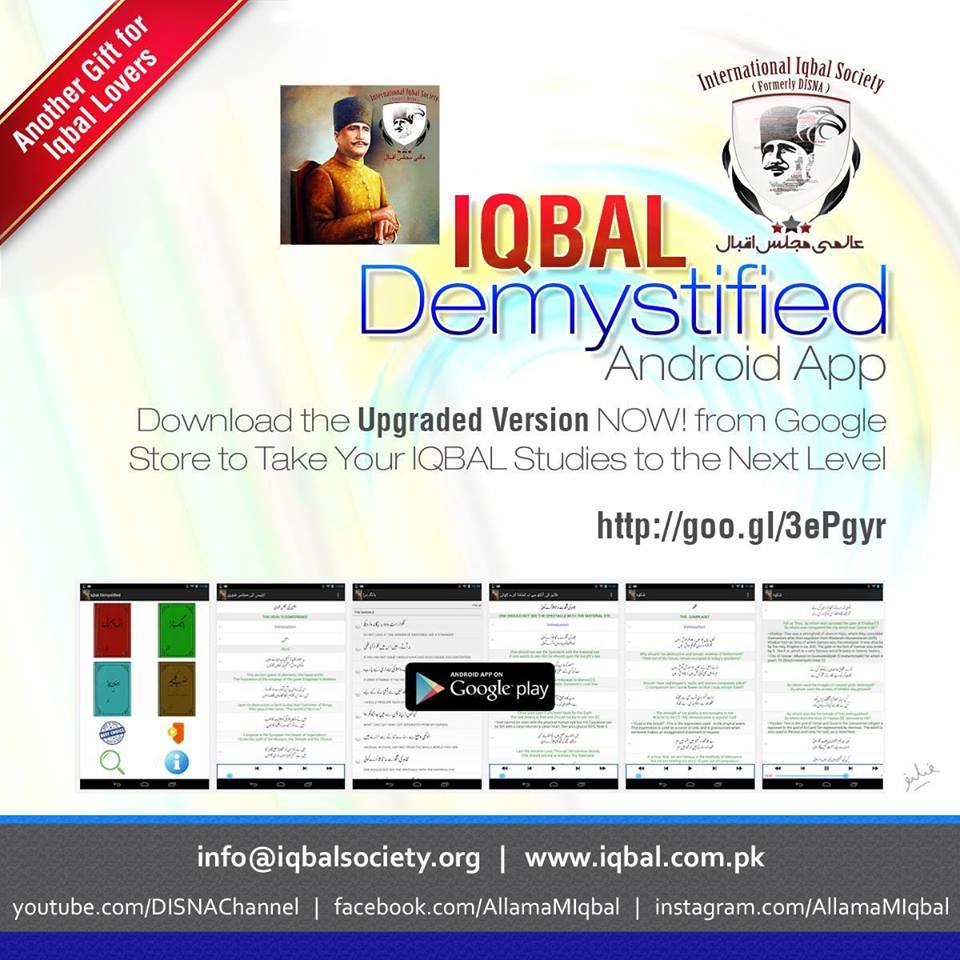Iqbal’s vision of a Muslim State
By Prof A.M. AATIF
Ever since the creation of Pakistan, we have been in mad pursuit of a good number of state ideologies, nevertheless, we miserably failed to select any of them. Unfortunately, the people at the helms of power failed to peep deep into the ideology presented by the philosopher father of Pakistan. Deeper study of the state ideology offered by him needs to be properly understood and implemented in true letter and spirit. Dr Allama Mohammad Iqbal in his letters to Quaid-i-Azam Mohammad Ali Jinnah on 28th of May 1937 wrote, “The problem of bread is becoming more acute; the Muslim has begun to feel that he has been going down and down during the last two hundred years; ordinarily, he believes that his poverty is due to Hindu money lending or capitalism.
The atheistic socialism of Jawaharlal is not likely to receive much response form the Muslims. The question, therefore, is how is it possible to solve the problem of Muslims poverty. Happily, there is a solution in the enforcement of the law of Islam and its further development in the light of modern ideas. After a long and careful study of Islamic law, I have come to the conclusion that if this system of law is properly understood and applied, at least the right to subsistence is secured to everybody. But the enforcement and development of Shariat of Islam is impossible in this country without a free Muslim State or states.”
Iqbal’s vision of a Muslim State or states was organically associated with implementation of Islamic Law and Islamic Sharia subjected to modern interpretations and Ijtihad. The sages’ vision regarding nature and formation of Islamic State was transparent, practical and was in strict conformity with its orthodox spirit. In 1911, he writes in Hindustan review (volumess xxii and xxiii), “I want to draw attention to the following two points:
- That the Muslim common wealth is based on absolute equality of all Muslims in the eye of law; there is no privileged class no priesthood, no caste system. The political ideal of Islam consists in the creation of a people born of a free fusion of all races and nationalities. Nationality with Islam is not the highest limit of political development; for the general principles of the law of Islam rest on human nature not on regularities of a particular people. The inner cohesion of such a nation would consist not in ethnic of geographic unity, not in the unity of language or social tradition but in the unity of religious and political ideal or in the psychological fact of like-mindedness.
- That according to the law of Islam, there is no distinction between the church and the state. The state with us is not a combination of religious and secular authority, but it is a unity in which no such distinction exists. The caliph is not necessarily the high priest of Islam; he is not representative of God on earth. He is fallible like other man and is subject, like every Muslim, to the impersonal authority of the same law.
Dr Iqbal throws light on the position and authority of the caliph or sovereign of the Muslims. In his words from a legal standpoint, the caliph does not occupy and privileged position. In theory, he is like other members of common wealth. He can be directly sued in an ordinary law court. The second caliph was once accused of appreciating a larger share in the spoils of water, and he had to clear his conduct before the people by production of evidence according to the law of Islam. In his judicial capacity he is open to the criticism of every Muslim.
Iqbal had clear and vivid approach towards the process of elections. He considers elections as a vital necessity in an Islamic state. In his own words “In theory, all Muslim, men and women, possess the right of election; there is no property qualification. Some of the early lawyers seem to have recognized the danger of mass elections as they endeavour to show that the right of election resides in the tribe of the Prophet. The elector has the right to demand deposition of the caliph, or the dismissal of his officials if their conduct is not in accordance with the law of Islam. Forced election is quite illegal. Ibn Jamma, an Egyptian lawyer, however holds that forced election is legal in times of political unrest. The opportunist view has no support in the law of Islam; though undoubtedly, it is based on historical facts.
Tartushi, a Spanish lawyer would probably hold the same view for he says, “Forty year of tyranny are better than one year of anarchry”. Al Mawardi defines this relation as “Aqd” binding together, contract in consequence of which the caliph does to do certain duties-to define the religion, to enforce the law of Islam, to levy customs according to the law of Islam, and to pay annual annual salaries. It is clear that the fundamental principle laid down in the Quran in the principle of election. The details of rather the translation of this principle in to workable scheme of government is left to be determined by other considerations.
Unfortunately, however, the idea of election did not develop on strictly democratic lines and the Muslim conquerors consequently failed to do anything for the political improvement of Asia. The form of election was certainly maintained in Baghdad and Spain but no regular political institutions could grow to vitalize the people at large.
On the question of relationship between the judiciary and the executive. Dr. Allama Mohammad Iqbal gives his views. In his own words, “the chief judge could be appointed by the caliph or the wazir. According to Abu Hanifa in some cases and according to Abu Jafr Tabary, a non-Muslim can be appointed to administer the law of his coreligionists. The chief judge as representative of the law of Islam can depose the caliph, he can kill his own creator. The death of the sovereign is not followed by the dismissal of the judges appointed by him. Iqbal believes in Islam as a political ideal aiming at complete reconstruction and revival of Muslims community. It is a breathing engine for the masses. In his own words, “I now proceed to consider the purely political aspect of the Islamic ideal – the ideal of Islam as entertained by a corporate individuality, we know that Islam is something more than a creed, it is also a community, a nation.
The membership of Islam as a community is not determined by birth, locality or naturalization; it consists in the identity of belief. The expression Indian Mohammedan, however, convenient it may be is a contradiction in terms; since Islam in its essence is above all condition of time and space.
Nationality with us is a pure idea; it has no geographical basis. But in as much as the average man demands a material centre of nationality, the Muslim looks for it in the Holy town of MAKKAH, so that the basis of Muslim nationality combines the real and ideal, the concrete and the abstract when, therefore, it is said that the interests of Islam are superior to those of the Muslims, it is meant that the interests of Islam are superior to those of the Muslims it is meant that the interest of the individual as a unit are subordinate to the interests of community as an external symbol of the Islamic principle.
This is the only principle, which limits the liberty of the individual, who is otherwise absolutely free. The best form of government for such a community would be democracy, the ideal of which is to let man develop all the possibilities of his nature by allowing him as much freedom as practically possible. Iqbal believes that ethical transformation in a state or society is only due to great personalities and it is the responsibility of a state or a society to prepare such personalities who may furnish the goal of formation of ethical ideal.
Dr Iqbal says, “Education, we are told, will work the required transformation. I may say at once that I do not put much faith in education as a means of ethical training. The ethical training of humanity is really the work of a great personalities who appear from time to time during the course of human history. Unfortunately, our present social environment is not favourable to the birth and growth of such personalities of ethical magnetism. An attempt to discover the lesson for this dearth of personalities among us will easily admit that such personalities are now rare among us.”
In today’s world, we have pathetically divorced religion from our collective spheres and no sincere effort to introduce true Islamic spirit in the status of politics seems working. The political thinkers and the men of authority need to comprehend true spirit of political ideal of Islam, which is a vital necessity to shower down happiness on humanity.
Source:
The Nation Monday, April 21, 2008






